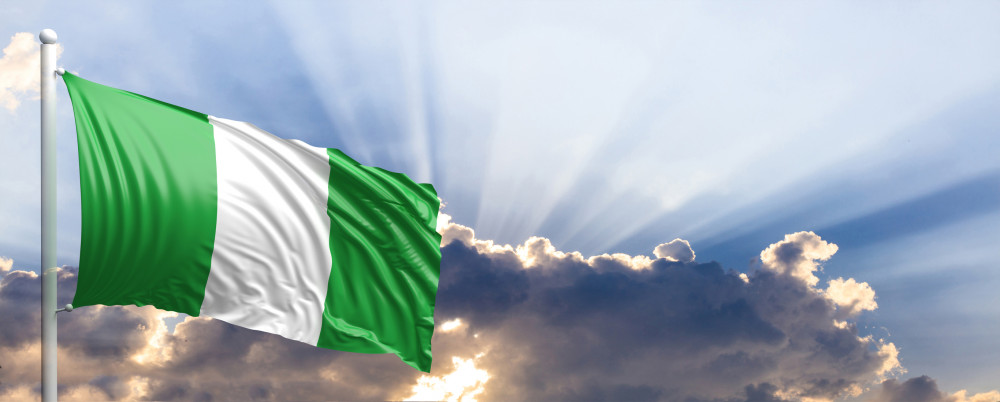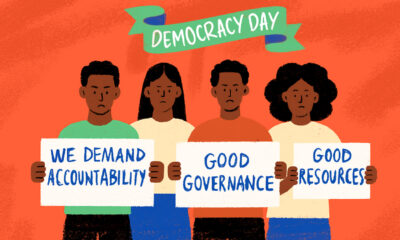Features
Olusanya Anjorin: Chronicling Democracy in Nigeria
As we celebrate Nigerian democracy today, one day, the history of this country will be written. Will yours be a story of glory and dignity, or goriness and vanity?
 The word democracy may have been misunderstood and misused by many. What do you call a tyrannical ruler who attempts to claim popular support by fastening democratic labels upon himself? Plato’s perception of democracy toed this line, when he said that the elite is a person who was born with the capacity and ability of being “gold.” But according to Oxford Advanced Learner’s Dictionary, “Democracy is a system of government in which all the people of a country can vote to elect their representatives.” In other words, power rests in the hands of the people, and as such, leaders are held accountable.
The word democracy may have been misunderstood and misused by many. What do you call a tyrannical ruler who attempts to claim popular support by fastening democratic labels upon himself? Plato’s perception of democracy toed this line, when he said that the elite is a person who was born with the capacity and ability of being “gold.” But according to Oxford Advanced Learner’s Dictionary, “Democracy is a system of government in which all the people of a country can vote to elect their representatives.” In other words, power rests in the hands of the people, and as such, leaders are held accountable.
The most popular definition of democracy is one defined by US President Abraham Lincoln (1809-1865). He defined it as “The government of the people, by the people, for the people.” In summary, democracy improves the quality of decision making, and lessens the chances of rash or reckless decision making. It allows people to speak their minds and shape their own future, and that of their unborn generations. An example of where democracy is at work, and where people have political freedom and fairness, is the United States of America (USA).
However, it has to be pointed out that how democracy works in different parts of the world, in practice, is a different kettle of fish.
The twenty-year journey of Nigerian democracy has been a twisting one, where the voters are being used as mere cannon fodder for politician self interest. The starting point began on the 1st of October, 1960, when Nigeria publicly announced its independence from Great Britain. But it took a firm root when we became a republic in 1963. It was a great source of pride and symbol of accomplishment. Our fate as a sovereign state was sealed.
In 1966, Nigeria experienced its first military coup, spearheaded by Kaduna Nzeigwu and Emmanuel Ifeajuna. The coup brought in Aguiyi Ironsi as the commander-in-chief. The military rule lasted until 1978, when the people were free to elect their leader again. It barely lasted five years, before the military took over again in 1983. It was a meandering of military rules from then until General Abdulsalami Abubakar took power, after the death of General Sani Abacha, in 1998. He kept his word when he handed over to democratic rule in 1999. That was how President Olusegun Obasanjo came to power. He ruled for eight years and left office in 2007, after handing over to the late Umaru Yar’adua. He lasted two years, and his vice, Goodluck Jonathan, took over as president. He was in the office until 2015, until the current President Muhammadu Buhari defeated him at the polls and re-contested in 2019, and won the election.
During the rule of General Ibrahim Babangida, it was a demonstration of crazy-passion for democracy, when the voters voted massively for late MKO Abiola, but the election was subsequently annulled. There were wide and wild agitations for the winner to be declared president, but it never happened. He, afterward, declared himself president, and was jailed on charges of treason.
Sadly, he died in the pursuit of his mandate. Consequently, the government that came before President Muhammadu Buhari opted to let the sleeping dogs lie, but he refused to toe the line of other rulers when he granted the late Abiola Grand Commander of the Federal Republic (GCFR), the highest national honour, and also declared June 12 as Democracy Day. It was a welcome development to millions of people in Nigeria.
History is sweet when narrating, as it keeps our memory green. But the process and reality of it can be excruciating.
That is the journey so far… To join the fray when the food is ready is pretty easy, but no one wants to butcher with effort. As we celebrate Nigerian democracy today, it’s apt to note that it did not come on a silver platter, but came because some Nigerians fought for it with their blood, tears and lives. While some pitched their tent to the ruling junta at that time, some had no choice but to flee the country or hide in the most remote villages. Others remained resolute to ensure that democracy did not die in Nigeria, among them are:
Frank Kokori
Frank Kokori, the then Secretary General of the Nigerian Union of Petroleum and Natural Gas (NUPENG) Workers, during the June 12 saga, played a pivotal role when he spearheaded his team in the protest against the annulment of the 1993 election. He stood firm on his pro-democracy values.
Anthony Enahoro
The elder statesman, publisher and activist, was considered one of the heroes of Nigerian independence group and one of the loudest voices that called for the recognition of the June 12, 1993, presidential election won by MKO Abiola. He led the coalition in the diaspora while on exile. The anti-colonial and pro-democracy activist was the Chairman of National Democratic Coalition (NADECO), the Movement for National Reformation.
Abubakar Umar
Despite the fact that he served under General Babangida, he was opposed to the annulment of the 1993 election. After he retired, he became a social critic and continued to fan the ember of fairness. This led him to found the Movement for Unity and Progress.
Wole Soyinka
Nobel Laureate, Wole Soyinka, has been a voice for the voiceless, and has made use of all available means. During the ruling of General Abacha, he went to the Federal High Court in Lagos asking the court to declare the Abacha government illegal. He also made use of international platforms drawing attention of the international community to event in Nigeria.
Gani Fawehinmi
The fiery lawyer and activist is one of the vocal voices Nigeria has ever produced. His mass followership ensured the government of the day was cautious of him. He was arrested several times by different governments, but that did not dissuade him from speaking against the government on matters he found incorrect.
Beko Ransome Kuti
Beko was a doctor and human rights activist. He was at the forefront of the battle against military invasion of the presidential powerhouse. He was jailed several times. He formed Campaign for Democracy which was used to tackle the Late Abacha’s rule.
Ndubuisi Kanu
A retired Rear Admiral, he pitched his tent as a democrat who pushed away military dictatorship in Nigeria. He played an active role in the actualization of the annulled June 12 election. He was one of the leaders of NADECO during the period.
Alfred Rewane
A successful business man and a close associate of late Obafemi Awolowo, a major financier of NADECO in the post-June 12 struggle. He paid the prize of being a patriot when he was murdered on October 6, 1995, by suspected assassins who stormed his G.R.A. Ikeja residence and snuffed the life out of him. Sadly, a man who hates injustice passionately paid with his lives.
Ayo Opadokun
Opadokun was one of the activists sent to prison under General Sani Abacha. He spent a part of his life behind bars in the battle to ensure democracy survived in Nigeria.
Abraham Adesanya
He was the leader of the Afenifere, as well as the deputy leader of NADECO. He mobilized against the plan by the Late General Abacha to install military governance in Nigeria. A politician, lawyer and activist.
Others also include: Tunji Braithwaite, Olusegun Osoba, Bolaji Akinyem, Bola Ige, Femi Falana, Olisa Agbakoba, Yinka and Joe Oke-Odumakin, Dele Momodu, Chima Ubani, Debo Adeniran, Ebun-Olu Adegboruwa, Omoyele Sowore, Segun Miayegun, Segun Okeowo, Femi Aborishade, Shehu Sani, Kayode Fayemi, Joe Igbokwe and several others, who made invaluable contributions to ensure democracy was upheld in the country.
In Africa, how do we preserve democracy? Most of our public servants see public service as a right, not a responsibility. They have seen provision of healthcare, education, infrastructure, public services, good governance, protection of lives and property as a special favour, and not a duty.
Elections in Africa are characterised by fraud, voter intimidation, ballot box snatching, multiple voting, and falsification of results. We might need an archangel to separate electoral democracy from the monumental and brazen electoral manipulations we have all witnessed.
What happens to democracy when we allow flawed elections and crooked systems to influence our decision? Every time there are flaws or malpractices in an election, the fathers of democracy twirl in their graves.
Every time a candidate is jailed for challenging the status quo, democracy is being clubbed.
Every time a candidate is excluded because he has no godfather, democracy is imprisoned.
Every time threats rain from national and local leaders to an officer to mar an election, democracy is set back.
Every time freedom of expression is attacked, a voice is stifled and democracy is caged.
Every time people are denied access to information, they cannot participate fully in the democratic process and make informed decision, and democracy suffers.
When we turn away from democratic values, and instead turn to tyrannical values, democracy bleeds.
When conflict is triggered by political competition and communal, ethnic, and religious rivalries, a gambolling among goats is being reared.
When a leader muzzles the bench and the bar without due process, democracy is violated.
When good governance is shortchanged due to corruption, democracy is desecrated.
Every time we disparage the freedom of the press and crack down on political dissidents, democracy’s tongue is dismembered.
When poor governance is deeply rooted in nearly every sector of the society, democracy is incarcerated.
We have failed to create a viable democratic system, seamless operation, and truthful dealing with one another. These have become worrisome, as what we have in all sectors are visible disillusions, where mediocrity is shaped as excellence and deception is dressed as honesty. A democracy that fails to represent the will of the people is a lifeless democracy.
All over the world, the bastion and custodian of democracy is the rule of law, and Nigeria cannot be an exception. The greatest threat to democracy is corruption; we therefore need to reinforce our cultural and ethical values that encourage good moral conduct and good behaviour.
As we celebrate Nigerian democracy today, one day, the history of this country will be written. Will yours be a story of glory and dignity, or goriness and vanity?














